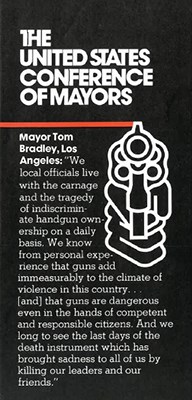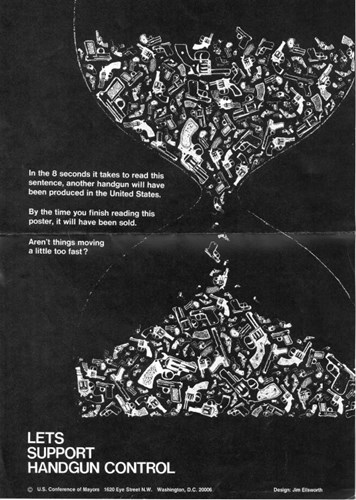The U.S. Conference of Mayors met for their 85th Annual Meeting from June 23-26 in sunny Miami Beach, Fla. Continuing a tradition almost as old as the meeting, the assembled mayors schemed on how to prevent the American people from exercising their right to keep and bear arms.
This year, Chicago Mayor Rahm Emanuel and New York Mayor Bill de Blasio put forward a resolution expressing the USCM’s opposition to National Right-to-Carry Reciprocity legislation. The resolution was adopted, with only Mayor Billy Hewes of Gulfport, Miss. and Mayor Kyle Moore of Quincy, Ill. registering their opposition.
As one might expect, the resolution was long on rhetoric and short on facts. According to the preamble to the resolution, National Right-to-Carry Reciprocity legislation is “dangerous,” and is “completely antithetical to all of the efforts to reduce and prevent gun violence.” More broadly, the mayors contend that “gun laws play a significant role… in the rapid decline of violent crime.” The resolution was immediately applauded by former-New York Mayor Michael Bloomberg’s Everytown for Gun Safety.
For 30 years, whenever Right-to-Carry legislation has been proposed in a new state, anti-gun activists have made hyperbolic predictions about the “carnage” that would result. None of these predictions have ever materialized. From the advent of the modern Right-to-Carry law in Florida in 1987 to today, the country has gone from having 10 Right-to-Carry states to 42 and permit reciprocity has improved. In that time period (to 2015) the violent crime rate decreased nearly 40 percent while the murder rate fell 41 percent.
A simple glance at the FBI’s violent crime statistics shows Right-to-Carry opponents’ fears have not come true. However, most of the academic research on Right-to-Carry laws has also shown that these laws either lessen or have no effect on crime rates.
Moreover, Right-to-Carry permit holders have proven themselves to be among the nation’s most law-abiding demographics. Right-to-Carry permit revocation data from Florida and Texas has repeatedly shown that permit holders are more law-abiding than the general public.
As to USCM’s sweeping contention about the general efficacy of gun laws, the evidence does not support their claim. A 2013 memo from the Department of Justice’s National Institute of Justice surveyed research on several types of gun controls popular with anti-gun activists, including so-called “universal” background checks, buybacks, magazine restrictions, and semi-auto bans. The NIJ argued that such controls were largely ineffective unless paired with further severe controls, such as confiscation. Similarly, a 2004 review of gun control by the National Academy of Sciences does not support USCM’s wild conclusions.
A History of Distortions and Support for Radical Gun Control
The sort of haphazard anti-gun rhetoric USCM adopted in Miami is nothing new for the organization. For nearly 50 years, USCM has advocated for the most radical forms of gun control.
In June 1972, USCM adopted a policy resolution on handgun control that called for the abolition of private handgun ownership. The resolution stated,
NOW THEREFORE BE IT RESOLVED that the United States Conference of Mayors takes a position of leadership and urges national legislation against the manufacture, importation, sale, and private possession of handguns, except for use by law enforcement personnel, military and sportsmen clubs;
Further, the resolution called on members to “educate the American public to the dangerous and appalling realities resulting from the private possession of handguns.” Not content to only target handguns, the policy also demanded legislation that “shall provide for the registration of all firearms.”
Like the latest USCM gun control resolution, a misleading preamble accompanied the 1972 policy statement. Despite the passage of the Gun Control Act of 1968 only four years earlier (which outlined most of the current categories of persons prohibited from possessing firearms), the preamble charged, “gun dealers today sell to the mentally ill, criminals, dope addicts, convicted felons, juveniles….” It also contended that “handguns are not generally used for sporting or recreational purposes, and such purposes do not require keeping handguns in private homes.”
[To see the U.S. Conference of Mayors’ 1972 Policy Statement on Handgun Control, click here]

In the 1970s, the USCM held multiple national forums on handgun control and launched the Handgun Control Project, which was bankrolled by the George Gund Foundation and served to advance USCM’s gun control efforts. The project produced anti-gun books, pamphlets, and a gun control newsletter titled “Targeting in on Handgun Control.” The project also provided support to gun control activists. At their 1979 National Conference on Handgun Violence, USCM voted to create the National Alliance for Handgun Control Organizations in order to better coordinate state and local anti-gun efforts.
In this capacity USCM actively supported state and municipal efforts to ban handguns. In 1976 Massachusetts held a referendum on whether to ban handguns in the state. The measure was defeated by a margin of 2 to 1, but the U.S. Conference of Mayors published a book lionizing the anti-gun movement’s efforts in the state, titled, “People v. Handguns: The Campaign to Ban Handguns in Massachusetts.”
USCM was also a staunch advocate for Washington, D.C.’s unconstitutional handgun ban, which was passed in 1976. Following the enactment of the ban, USCM produced an analysis that purported to show the benefits of the new law. A subsequent review of USCM’s work conducted by the Congressional Research Service found “substantial evidence that the study is flawed by an inappropriate model,” and challenged its conclusions. USCM’s study was little more than anti-gun propaganda, as CRS explained, “Although the Firearms Control Act may have affected the crime rate in the District of Columbia, it is our judgment, based on the information at hand, that the study fails to establish such a relationship.”
In 1977, USCM published a book titled, “Organizing for Handgun Control: A Citizen’s Manual.” As the title suggests, the book was a how-to guide for those seeking to further the group’s anti-handgun agenda. In it, the organization took the position that the Second Amendment offered no protection to American gun owners, stating, “The amendment neither guarantees nor denies the right of individual citizens to carry guns or keep guns in their homes.” Reiterating this point, the same book accuses NRA of being “the leading self-appointed guardian of citizens’ mythical Constitutional right ‘to keep and bear arms.’”
Further, a 1975 USCM document accused gun rights supporters of “distorting” the facts about the Second Amendment. A 1979 USCM publication told readers, “A constitutional right to bear arms does not exist,” and noted, “the Second Amendment is an anachronism today.”
Of course, subsequent legal scholarship would refute USCM’s inaccurate position, as would the United States Supreme Court in District of Columbia v. Heller and McDonald v. Chicago.
Another constant theme USCM’s 1970s propaganda was their contention that an increase in the number of handguns in private hands would necessarily result in greater violence. For instance, in a 1977 publication, the organization contended,
The dramatic increase in handgun homicides, robberies, assaults, suicide, and accidents can be traced to an equally alarming increase in the volume of handguns distributed to the civilian market. If the present rate of increase is allowed to continue, there will be over 100 million handguns in American homes by the year 2000. It is unlikely that future generations of Americans will be able to manage a safe and harmonious society with such a volume of killing power so readily available.

Experience has proven this prediction demonstrably false.
Americans now own roughly 150 million handguns, and the U.S. continues to manufacture or import 6-7 million new handguns each year. FBI data shows that from 1977 to 2015 the violent crime rate has decreased by nearly 22 percent and the murder rate has fallen by 44 percent. Americans now live in a safer and more harmonious society than in 1977.
USCM’s Handgun Control Project was formally terminated at the end of 1981. However, despite the elimination of their formal anti-gun initiative, USCM has continued their attacks on the Second Amendment.
In the 1990’s USCM supported Bill Clinton’s gun control efforts and move to bankrupt the gun industry through frivolous litigation.
In 1994, USCM supported Clinton’s ban on commonly owned semi-automatic firearms. In 2004, after government-mandated research showed that the ban did not impact crime, USCM called for an extending the ban. In 2013, when Sen. Dianne Feinstein (D-Calif.) sought to enact a more onerous version of the 1994 ban, USCM supported her legislation.
Still holding onto their antiquated Second Amendment theories when Heller reached the Supreme Court in 2008, USCM joined with Legal Community Against Gun Violence (now Law Center to Prevent Gun Violence) in a friend of the court brief that argued in favor of upholding Washington, D.C.’s unconstitutional handgun ban.
In addition to the passage of the National Right-to-Carry Reciprocity, this year’s USCM meeting also featured a speech by Michael Bloomberg, where he announced that he would be giving $200 million of his vast fortune to a new city-focused policy initiative. According to the New York Times, the Bloomberg initiative “would serve in part as an extension of his advocacy for national policies that address climate change, gun violence, public health and immigration.”
It is yet unclear how Bloomberg’s new city initiative and USCM’s work on gun control might evolve. However, given the scale of Bloomberg’s new project, his friendly relationship with USCM, and USCM’s recent attack on National Right-to-Carry Reciprocity, Gun rights supporters should do all they can to inform others of this anti-gun group’s lengthy history of distortion, failed predictions, and support for the most radical forms of gun control.










 More Like This From Around The NRA
More Like This From Around The NRA








